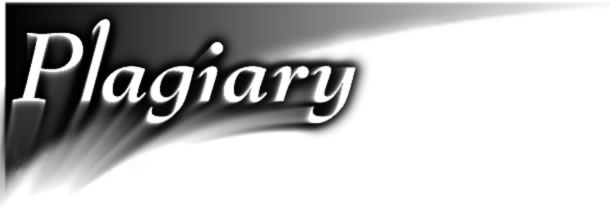Mailing Address:
John P. Lesko, Editor
Department of English
Saginaw Valley St. Univ
University Center, MI
USA 48710
989-964-2067
989-790-7638 FAX
Email:

|


This work is licensed under a Creative Commons
License (Attribution, Non-Commercial, No Derivatives 2.5 License).
|
|
|
|
Advance Online Version Volume
4, 2009
Papers
and Perspectives
(Adobe reader required for full
text of articles--download here)

An Examination of Changes in the Use of Digital Technologies
for the Monitoring of Academic Integrity Issues at the University
Level
Garry Allan
Plagiary 2009 4(1): 1-6 (12 January 2021)
Abstract
The nature of the student learning process has fundamentally
changed as a result of the expanded array of electronic information
sources. This change has been rapid and its ongoing evolution
will continue to facilitate the development of knowledge synthesis
capabilities in University graduates. Universities have recognised
that within this dynamic, assessment practices must develop
in a manner that retains the full integrity of the assessment
process. As a consequence, electronic tools for the monitoring
of academic integrity have been introduced at whole-of-University
level in a number of Australasian Universities. Reported here
is an overview of the change processes associated with a methodical
implementation of this technology into the University environment.
Emphasis is placed on the actions necessary to integrate the
latest generation of academic integrity monitoring systems into
a stable and sustainable component of student assessment practice
University-wide. This includes communication to students that
is well-matched to their understanding, and specifically covering
the expectation of evidence-based writing at University level.
It is acknowledged that text-matching technologies are at an
early stage of evolution, and examples of developing Web-based
service-oriented architectures for software in this field are
presented.
A Survey of Samford University Students Regarding
Plagiarism
and Academic Misconduct
Robert H. Schrimsher, Lori A. Northrup, and Susan P. Alverson
Plagiary 2009 3(2): 1-17 (11 February 2021)
Abstract
The purpose of this study was to obtain students’
attitudes and opinions at Samford University regarding plagiarism
and academic misconduct by means of an Internet-based survey
system composed of yes/no questions and Likert-type rating
scales. Data from 681 of approximately 4,500 Samford University
students (15% return rate) were analyzed. Research indicates
that plagiarism and other incidents of academic misconduct
are on the rise for a variety of reasons. Students seemingly
have the notion that Internet information is public knowledge
and is thus free from intellectual property rights; therefore,
they do not seem to think Internet information needs to
be cited for academic purposes. The vast majority of Samford
students agreed that if one submits a paper written by someone
else, this would constitute plagiarism; and that it was
unacceptable to copy/paste information from the Internet
without proper citations. Slightly less than a majority
of students disagreed that cheating was widespread at Samford;
and a majority indicated that faculty should clarify their
expectations regarding academic integrity. The results are
somewhat similar to other plagiarism and academic misconduct
studies.
The full text of all papers and perspectives
articles will be made available through the University of Michigan's
Scholarly Publishing Office in structured electronic text format.
Links to advance online versions of these articles appear after
the abstracts above. Hardcopy annual version will be published
at the end of each calendar year. The views, opinions, and research
results in these "Papers and Perspectives" articles
are those of the respective authors who assume
full responsibility for their article content per the Plagiary
submissions guidelines. Responses
and critiques relating to these "Papers and Perspectives"
may be sent to the Editor. Authors will be given an opportunity
to reply prior to publication of any responses/critiques.
Paper proposals and manuscripts accepted for publications
consideration on an ongoing basis.
Plagiary represents a wide range of research
topics which address general and specific issues relating to plagiarism,
fabrication, and falsification. Devoted specifically to the scholarly,
cross-disciplinary study of plagiary and related behaviors across
genres of communication, Plagiary features research articles
and reports on discipline-specific misconduct, case studies (historical
and modern; inter-/intra-lingual), legal issues, literary traditions
and conceptualizations, popular genres of discourse, detection
and prevention, pedagogy (cheating & academic integrity),
technical reports on related phenomena, and other topics of clear
relevance (parody, pastiche, mimicry) along with book reviews
and responses to published articles.
See the "Information for Authors"
page for further details.
Send queries to the Editor of Plagiary
at

|
|
|
|
|
| |
|
....
|


